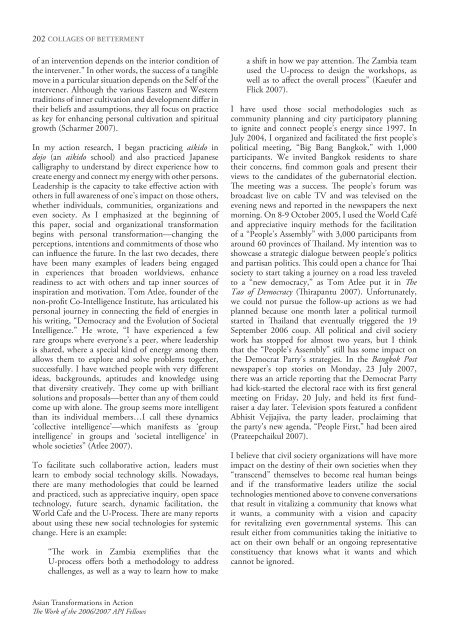Asian Transformations in Action - Api-fellowships.org
Asian Transformations in Action - Api-fellowships.org
Asian Transformations in Action - Api-fellowships.org
You also want an ePaper? Increase the reach of your titles
YUMPU automatically turns print PDFs into web optimized ePapers that Google loves.
202 COLLAGES OF BETTERMENTof an <strong>in</strong>tervention depends on the <strong>in</strong>terior condition ofthe <strong>in</strong>tervener.” In other words, the success of a tangiblemove <strong>in</strong> a particular situation depends on the Self of the<strong>in</strong>tervener. Although the various Eastern and Westerntraditions of <strong>in</strong>ner cultivation and development differ <strong>in</strong>their beliefs and assumptions, they all focus on practiceas key for enhanc<strong>in</strong>g personal cultivation and spiritualgrowth (Scharmer 2007).In my action research, I began practic<strong>in</strong>g aikido <strong>in</strong>dojo (an aikido school) and also practiced Japanesecalligraphy to understand by direct experience how tocreate energy and connect my energy with other persons.Leadership is the capacity to take effective action withothers <strong>in</strong> full awareness of one’s impact on those others,whether <strong>in</strong>dividuals, communities, <strong>org</strong>anizations andeven society. As I emphasized at the beg<strong>in</strong>n<strong>in</strong>g ofthis paper, social and <strong>org</strong>anizational transformationbeg<strong>in</strong>s with personal transformation—chang<strong>in</strong>g theperceptions, <strong>in</strong>tentions and commitments of those whocan <strong>in</strong>fluence the future. In the last two decades, therehave been many examples of leaders be<strong>in</strong>g engaged<strong>in</strong> experiences that broaden worldviews, enhanceread<strong>in</strong>ess to act with others and tap <strong>in</strong>ner sources of<strong>in</strong>spiration and motivation. Tom Atlee, founder of thenon-profit Co-Intelligence Institute, has articulated hispersonal journey <strong>in</strong> connect<strong>in</strong>g the field of energies <strong>in</strong>his writ<strong>in</strong>g, “Democracy and the Evolution of SocietalIntelligence.” He wrote, “I have experienced a fewrare groups where everyone’s a peer, where leadershipis shared, where a special k<strong>in</strong>d of energy among themallows them to explore and solve problems together,successfully. I have watched people with very differentideas, backgrounds, aptitudes and knowledge us<strong>in</strong>gthat diversity creatively. They come up with brilliantsolutions and proposals—better than any of them couldcome up with alone. The group seems more <strong>in</strong>telligentthan its <strong>in</strong>dividual members…I call these dynamics‘collective <strong>in</strong>telligence’—which manifests as ‘group<strong>in</strong>telligence’ <strong>in</strong> groups and ‘societal <strong>in</strong>telligence’ <strong>in</strong>whole societies” (Atlee 2007).To facilitate such collaborative action, leaders mustlearn to embody social technology skills. Nowadays,there are many methodologies that could be learnedand practiced, such as appreciative <strong>in</strong>quiry, open spacetechnology, future search, dynamic facilitation, theWorld Cafe and the U-Process. There are many reportsabout us<strong>in</strong>g these new social technologies for systemicchange. Here is an example:“The work <strong>in</strong> Zambia exemplifies that theU-process offers both a methodology to addresschallenges, as well as a way to learn how to makea shift <strong>in</strong> how we pay attention. The Zambia teamused the U-process to design the workshops, aswell as to affect the overall process” (Kaeufer andFlick 2007).I have used those social methodologies such ascommunity plann<strong>in</strong>g and city participatory plann<strong>in</strong>gto ignite and connect people’s energy s<strong>in</strong>ce 1997. InJuly 2004, I <strong>org</strong>anized and facilitated the first people’spolitical meet<strong>in</strong>g, “Big Bang Bangkok,” with 1,000participants. We <strong>in</strong>vited Bangkok residents to sharetheir concerns, f<strong>in</strong>d common goals and present theirviews to the candidates of the gubernatorial election.The meet<strong>in</strong>g was a success. The people’s forum wasbroadcast live on cable TV and was televised on theeven<strong>in</strong>g news and reported <strong>in</strong> the newspapers the nextmorn<strong>in</strong>g. On 8-9 October 2005, I used the World Caféand appreciative <strong>in</strong>quiry methods for the facilitationof a “People’s Assembly” with 3,000 participants fromaround 60 prov<strong>in</strong>ces of Thailand. My <strong>in</strong>tention was toshowcase a strategic dialogue between people’s politicsand partisan politics. This could open a chance for Thaisociety to start tak<strong>in</strong>g a journey on a road less traveledto a “new democracy,” as Tom Atlee put it <strong>in</strong> TheTao of Democracy (Thirapantu 2007). Unfortunately,we could not pursue the follow-up actions as we hadplanned because one month later a political turmoilstarted <strong>in</strong> Thailand that eventually triggered the 19September 2006 coup. All political and civil societywork has stopped for almost two years, but I th<strong>in</strong>kthat the “People’s Assembly” still has some impact onthe Democrat Party’s strategies. In the Bangkok Postnewspaper’s top stories on Monday, 23 July 2007,there was an article report<strong>in</strong>g that the Democrat Partyhad kick-started the electoral race with its first generalmeet<strong>in</strong>g on Friday, 20 July, and held its first fundraisera day later. Television spots featured a confidentAbhisit Vejjajiva, the party leader, proclaim<strong>in</strong>g thatthe party’s new agenda, “People First,” had been aired(Prateepchaikul 2007).I believe that civil society <strong>org</strong>anizations will have moreimpact on the dest<strong>in</strong>y of their own societies when they“transcend” themselves to become real human be<strong>in</strong>gsand if the transformative leaders utilize the socialtechnologies mentioned above to convene conversationsthat result <strong>in</strong> vitaliz<strong>in</strong>g a community that knows whatit wants, a community with a vision and capacityfor revitaliz<strong>in</strong>g even governmental systems. This canresult either from communities tak<strong>in</strong>g the <strong>in</strong>itiative toact on their own behalf or an ongo<strong>in</strong>g representativeconstituency that knows what it wants and whichcannot be ignored.<strong>Asian</strong> <strong>Transformations</strong> <strong>in</strong> <strong>Action</strong>The Work of the 2006/2007 API Fellows
















